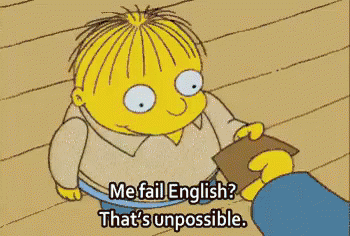If you read read as read and not read, you have to re-read read as read so you can read read correctly so it can then make sense
I’m so English I got it right first try 😎😎😎

I’ve never noticed, but is part of the joke with that Simpsons bit that that sentence is technically grammatically correct? Even unpossible is a real word, just outdated.
Well just learned something new about an episode I have watched probably 30 times! Thanks for that one.
Yeah, what’s missing is the punctuation and his delivery but it could be “Me? Fail English? That’s unpossible!”
People who speak English as their first language don’t even get this stuff right
I mean we kind of get it, but i would guess it would be no more than a native Italian speaker understanding how to use irregular verbs and all their tenses properly.
Source: am learning Italian, get wildly confused every now and then haha.
Welcome to English!
“What are the rules?”
(Satanic laughing)“Do you even follow the rules”
“No but if you break them in a way that doesn’t feel intentional we’ll laugh at you”
The secrèt, tu braek then on porpouseh avery thime iss.
“Well take the rules of all the languages of the ones that conquered England and you get a pretty good idea. Oh and drop the grammatical gender, we don’t do that anymore.”
It’s easier to understand when you look at English history and realize that English is essentially three different languages (old Saxon, Norse, and Norman) badly put together (a great example of this being meats having different names than the animals they come from, since the people farming said animals spoke Saxon, but the people eating them spoke Norman), with plenty of Latin, Greek, French, and other languages sprinkled on top, all written with a limited alphabet that’s incapable of properly reflecting the pronunciation of those languages’ words.
It doesn’t help, though ,that at some point the English alphabet got simplified with things like ō becoming things like oo, without taking into account that things like oo were already being used to represent different sounds, or that at one point over a period of a few decades in the middle ages for some reason all English speakers seemed to decide to randomly switch around the pronunciation of all their vowels without changing how they wrote them (!?), or that, while all languages borrow words from others, unlike most others English for some reason doesn’t bother to adapt their orthography or grammar (a French or Catalan speaker will have no problem understanding why façade is written like that and pronounced fassade instead of fackade, for instance, but I’m sure most English speakers won’t be so lucky, especially if they write it facade… and then you’ve got things like fiancé, or the plural of radius being radii, and so on)… and you end up with the oos in book, blood, door, and boot all being pronounced differently… and, for some reason (probably the borrowing one), the one in brooch being pronounced a particular fifth different way… 🤷♂️
Book and blood have the same oo’s for me by the way. I’m from the north east. But I understand southerners will say book differently. So not only is everything you said is true we also have a crazy amount of local differences across the country with very short distances between them at times.
I tried seeing how id pronounce it if they were the same and i feel like it was roughly /ɜ/, what is it for you
Book is exactly the same as buck in my accent. So blood would be like blud. Sorry i don’t know phonetics.
Love this little bit of cheeky language history!
What’s the difference between Norse and Norman?
Norse is old Norwegian/Danish kinda.
Norman is old French.
The Normans were northmen (aka Scandinavians) that were allowed to settle in the Normandy (north west France). (They were the ruling class, the inhabitants from before continued to live there).They then adopted the French language.
I explain to people here that - in modern terms - it’s mixture of french, dutch, and welsh - you forgot the celtic /gaelic root (whatever you want to call it).
Yeah, I sort of forgot the Angle part of Anglo-Saxon, didn’t I…?
(Plus, there was probably quite a bit of Latin already there before the Norse and the Norman, at least south of Hadrian’s wall, though far from enough to make Old English a Romance language… all in all English has a very complex history.)
Buffalo Buffalo buffalo buffalo buffalo Buffalo buffalo.
Police police police police. Who polices the police police? The police police police police police police.
The old man the boats.
solution
It’s ((the old) man (the boats))
Bob, while Bill had had had had had had had, had had had been more correct.
That was thoroughly thought through.
Wasn’t it, though?
I thought it was pretty thorough throughout
Though I thought it was tough on our cherished Anglo-Saxon tongue, I was taught the trouble with the th- and -ough things thoroughly.
touch and though really show the fucking weirdness of English best.
I hate that its the world language. Where did Esperanto go. Its an actually made up language, composed or many ones, easy to learn.
Language sucks. The history of English, German, damn Norwegian, Dutch, Danish, Swedish, are all so damn weird. And we literally live a few days by bike apart from each other.
Why do there need to be multiple languages really? Its such a barrier.
If everyone would just learn esperanto, we could focus on learning something actually useful, like signing (gesture language). Then we have two languages we can talk with about everyone in the world.
Everyone learning esperanto is a bigger ask than overhauling the spelling of what is already an internationally spoken language.
It really isn’t. You’re thinking about it as an anglophone, but everybody else already has to go through the effort of learning a new language - it doesn’t matter if it’s English or Esperanto. The real issue is in porting over everything to a completely different set of rules.
If no-one spoke english as a second language right now, that would be true. As it stands though, hundreds of millions have already learned english, and our global communications and trade infrastructure is based around it. Switching to a new language would mean everyone who currently speaks english needs to learn an additional language.
If we could start from scratch then a constructed language like esperanto would make more sense than using any natural language, but if we want to make a change to the system that already exists, then reforming the spelling and grammar of the language currently in use makes more sense practically.
Fixing english is not possible.
German could be fixed, just remove pronouns and all the stupid rules that make no sense.
But english makes no sense, half the words would need to be pronounced differently.
No need to pronounce them differently when you can adjust the spelling.
God ruined it for us. Damn tower of babel!
La fina venko!
Esperanto’s nice but a century old and reflects some biases of that time. If advocating auxlangs, I’d prefer one that aims for a more global balance of vocabulary sources, for example Lidepla, Globasa…
If only there was just one sign language…
English is the Taco Bell menu of languages
I have no idea what that means, but it sounds accurate
I’ll just leave this here… 😈
Banquet is not nearly parquet, Which exactly rhymes with khaki.
These words do not rhyme in American English (par-kay and kak-ee). Which makes things even more challenging for English learners.
YouTube video of someone reading this poem because reading it yourself is simply impossible.
Here is an alternative Piped link(s):
Piped is a privacy-respecting open-source alternative frontend to YouTube.
I’m open-source; check me out at GitHub.
Thou thought thoroughly. Though throughout tough times, through tenacity, 'tis taught.
deleted by creator
What does it translate to literally? Perhaps there’s a more concise way to say it in English.
“even the most complicated ones” according to Google.
deleted by creator
deleted by creator
Trough!
Taut and tout as well
Ah, du süßes Sommerkind
Werden, werde, würde, würden, wird, wäre, war, wären, werdet, würdet, wirst…
Aber immerhin ist die Aussprache der Buchstaben konsistent.
Aber auch nur, wenn man sauber Hochdeutsch spricht.
Auch lustig für Fremdsprachler: “für sich” und “Pfirsich”
They forgot about “throat”
What about trough lol
True
Not enough spider men in the image, haha.
Just memorize them by rote. There’s nothing actually connecting them via spelling; they’re completely different words with completely different backgrounds and that’s a thing you have to get used to in English.
Remember English is a creole of a bunch of different languages and that’s why it is the way it is. It doesn’t really have rules like that aside from some basic grammar.
Yeah it’s like a mad concoction of Germanic, Brythonic, old French, and Norse influences. So many loan words!
I am so glad to be a native English speaker… although I would have been a lot happier to have been Canadian. Everyone blames us Americans for the way English is without giving a thought to Britain. Or Australia.
Australian English is just a weird combination of American and British English, plus a whole heap of slang words.
Creoles/Pidgins of English often solve some issues, which I find funny. The Vanuatu creole (Bislama) changes all words that connect nouns to “blong” (belong)
Pikini blong mi: This child belongs to me, Kanu blong pikinini: That outrigger belongs to the child, Laet blong trak: The light on the truck, Finga blong tri: The branches of a tree, Bras blong tut: Toothbrush…or “long”
Pikinini i go long skul: The child goes to school truk i kam long hotel: The vehicle came from a/the hotel tri i foldaon long trak: A tree fell down on a/the vehicleThere is only one second+ person pronoun: “hem” and one personal pronoun: “mi”
So how would you know which blong is which? 🤔















